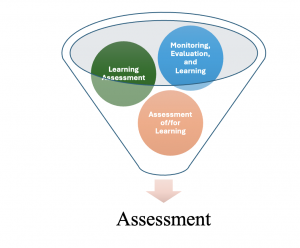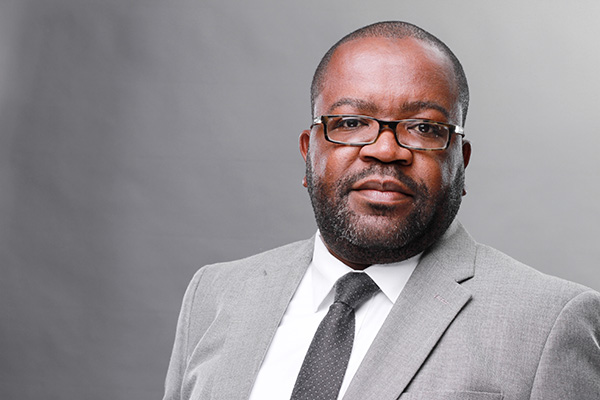MEL vs Assessment of/for Learning

When it comes to innovations that aim to transform teaching and learning practices or environments, there are concepts that I often see getting mixed up but should not: Monitoring, Evaluation, and Learning, Learning Assessment, or Assessment of/for Learning. All are important and have some overlaps, but we should not treat them as the same or assume that being skilled in one means you have skills in all. They require different skill sets, so a person who has expertise in one area does not necessarily mean they have expertise in another. The basic distinction I make is this: MEL is about a program or project, and Learning Assessment or Assessment of/for Learning is about the learner.

MEL (Monitoring, Evaluation, and Learning)
MEL (some use PME – Planning, Monitoring and Evaluation or PMEAL – Planning, Monitoring, Evaluation, Accountability, and Learning) focuses on whether a project or program is working and what can be learned from it to improve it. Broadly, MEL positions are common in development organisations, humanitarian sectors, and even educational institutions to ensure that resources spent are leading to desired ROI, to assess whether they are achieving project or program goals and know what they can do to improve.
I am sure many others have different explanations, and there are various frameworks/approaches, but this is how I broadly (albeit simplistically) conceptualise the three MEL categories:
- Monitoring – This is about tracking activities and outputs to ensure you are doing what you planned.
- Evaluation – The evaluation in MEL focuses on assessing outcomes and impact. It examines the effectiveness, efficiency, and outcomes as a way of gathering information that can inform decisions about the future of activities, projects, or programs. In other words, the E in MEL looks to answer questions such as “Did the program achieve its goals?”
- Learning – I think this is the part that people often confuse with assessing for learning. The L in MEL is not about individual learning, but rather what we can learn from the activity, project, or program itself to inform future strategies. The focus here is not about whether the individual has learned, unless that learning is tied to the broader goal of the project.
Learning Assessment or Assessment of/for Learning
Although there are nuances between the terms “Learning Assessment” and “Assessment of/for Learning”, for the context of this conversation, I am using them interchangeably. Learning happens in the individual. Yes, it occurs within a specific context and is influenced by culture and various other variables. Still, in the end, learning assessment is about determining if an individual has acquired the necessary knowledge or skills to meet learning objectives. It is the learner who acquires knowledge and skills that enable them to do something they could not do before, know something they did not know before, or improve on what they already know. As an example, you can give a final exam at the end of the term to see what someone has learned, but you would not do that to a program.
Not mutually exclusive
These terms and skillsets are not mutually exclusive. In education and specifically when rolling out EdTech programs, it is important to have both a MEL practitioner and someone who specializes in Assessing Learning. MEL can be used to assess a company or the product overall as a way of measuring success and sustainability. Learning assessments can focus on learning gains that the program and product promise the learners will achieve. For example, if you have a program that rolls out products to a region that promises to teach people how to read and write, then the learning assessment should be able to actually show that the individual(s) have learned to read and write. The MEL part can focus on the different parts of that rollout to determine how it went, for example were there enough products, were they rolled out efficiently. Put differently, it would not make sense to hire someone whose expertise is in Learning Assessments or Assessments of learning to evaluate whether a school feeding program is effective. The approaches used may not be the most effective in determining whether a project is overall effective.
I am not dismissing or looking down on either MEL or Learning Assessment/Assessing Learning. Both have places. Without MEL, it is challenging to convince funders/investors, especially if you are an organisation hoping to scale. Similarly, without assessing learning through various learning assessments, it will not be possible to make claims about learning gains.
The conflating of MEL and Learning Assessment, or Assessment of/for Learning, is not helpful and, in the long run harmful. MEL looks at the big picture of whether a project or program is working and what can be learned for improvement. Learning assessment looks at the individual or group learning outcomes to see if the intended knowledge or skills were acquired. Without a person who focuses on MEL, it is challenging to determine why a project was successful or why it failed, and what lessons can be learned for the future. At the same time, without someone who has a keen understanding of Learning Assessment or Assessment of/for Learning, you may not have data that can inform ways to improve learning content, or to make claims about what learning materials were effective or ineffective, or even devise learning strategies that can improve the product. Unfortunately, when it comes to making a choice, many people rely too heavily on MEL expertise to inform their learning practices or journeys. My hope is really that we start to value both and use them in their appropriateness.

